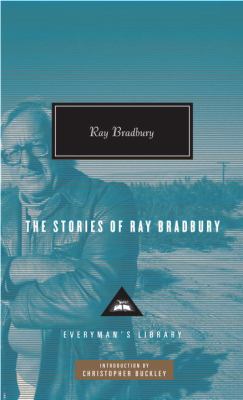Summer Reads: Vecchione on The Stories of Ray Bradbury

I have read two books this summer (not including books on tape) -- Dance With Dragons and an anthology of the short stories of Ray Bradbury (with a forward by Christopher Buckley, of all people). There are plenty of places to go find out about Westeros so I’ll just give an appreciation, rather than a review of Bradbury’s anthology. Bradbury still lives in Los Angeles where he moved, like Ronald Reagan, from the prairie -- long ago, before world wars had numbers.
For 70 years, he has written the equivalent of about one short story every week. Reading a compendium of these short stories brings you back to the Golden Age of science fiction. Mars was going to be inhabited by now. Nukes were going to make the earth uninhabitable. Time machines were going to have us all hunting dinosaurs and we would all have personal helicopters for transportation. Even now, Bradbury stories are serving as models for TV shows and movies. I learned a little while ago that he and the other Ray of my childhood, Harryhausen -- also very old, but still alive -- have been friends since 1939 and collaborated on The Beast From 20,000 Fathoms. The inspiration for the movie The Fog Horn is in this book.
I have read many of these stories before, but not the majority. I enjoyed both, but in different ways. Certain themes emerge again and again.
First, the permanency and desirability of the nuclear family. It appears everywhere -- not just on earth, but when man ventures to other planets, in Bradbury’s fiction he often does so like the pioneers did with the whole family. There is none of Heinlein’s polymorphous perversity for him.
Second, the closeness of the uncanny to normal life. Is the guy living in your mom’s boarding house just a guy with a night job or a real vampire?
Finally, the ever-present threat of civilizational destruction by man and war. Fortunately, very few of us today believe that the entire world will end in nuclear fire. A city or even a country, yes, but not the whole world. This was the main preoccupation of science fiction writers from the end of the Second World War to the 1970’s. I never thought Mutually Assured Destruction would seem quaint, but somehow it does. I also thought we would be on Mars by now, and with the horrible American space program, some of these stories almost hurt to read. Nobody in those days doubted we would go into space and that once there we would stay.
However, one problem with this volume of work and the impact it has had on the world is that Bradbury’s “trick” endings are not so tricky anymore. When the martians turn out to be humans adapting after many years, we are not surprised. There is also a number of series that I do not recall, but that remind me of the New Yorker cartoons of Charles Adamms, which inspired the Addams family. These tales are more macabre than science fiction and can raise goose flesh as I read them during a power failure by candle light. Highly recommended. (I have just googled this, and the the relationship to Morticia, Gomez and the rest is not coincidental.)
Ray Bradbury is one of the giants of science fiction. Some of the writers of the Golden Age don’t hold up well upon rereading. But for some of them, the spell never loses its charm. Bradbury is one of those. His prose style is part of that. The clunkiness of a great number of science fiction is almost absent with him. Pick up this book or get it from the library, as I did, and peer into a time, not so long ago, when Mars had people.

